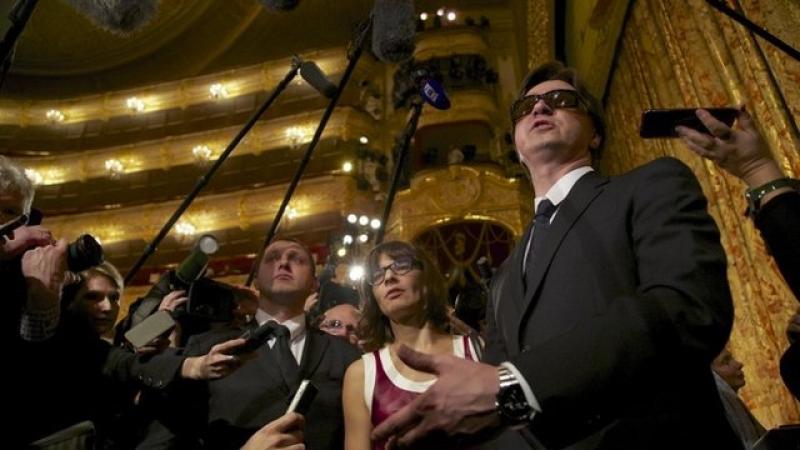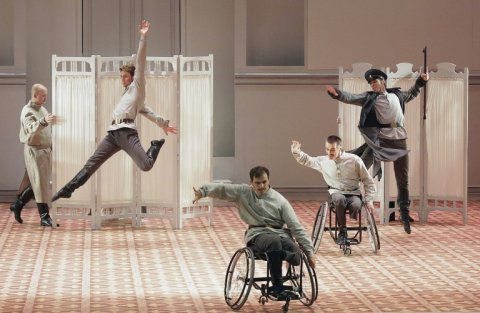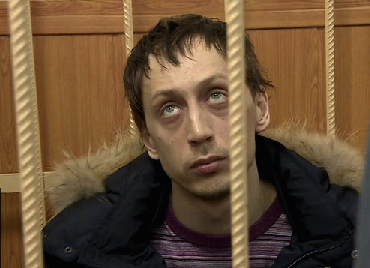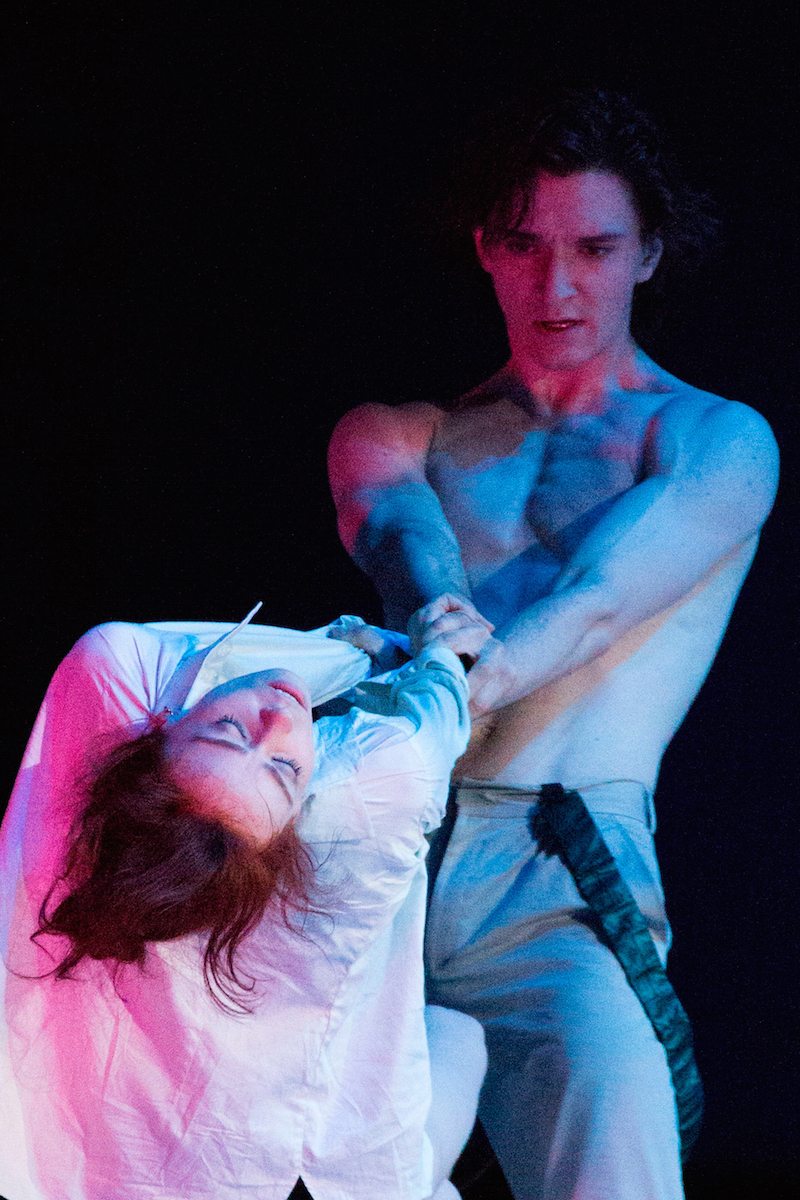Bolshoi Ballet acid attack leader loses his job | reviews, news & interviews
Bolshoi Ballet acid attack leader loses his job
Bolshoi Ballet acid attack leader loses his job
Sergei Filin's contract will not be renewed, and his post abolished

Sergei Filin, the Bolshoi Ballet artistic director whose sight was maimed two years ago by an acid attack organized by a disgruntled dancer, will lose his job when his contract expires next spring. Bolshoi Theatre chief Vladimir Urin announced yesterday in Moscow that he is abolishing Filin’s position and replacing it with a more management-focused director, indicating that artistic decision-making is to be taken "jointly" with the theatre directorate.
The new director will be named and introduced in September when the company returns from their summer break. Urin refused to give a name, but it does appear from his choice of pronouns to be a man.
The theatre chief said the change is due to "matters concerning the theatre's internal life", but insisted that Filin’s authority and stamp on the next season will remain unquestioned, with the last of his scheduled commissioned premieres being Ondine by Vyacheslav Samodurov (an admired former Royal Ballet principal who began his choreographic development in Britain) and a work by Dutch contemporary choreographers Paul Lightfoot (ex Royal Ballet School) and Sol Leon.
Filin, 44, will also apparently figure in the Bolshoi’s tour to London next summer, and Urin said discussions are going on about retaining him in the capacity of a "specialist" with the Bolshoi Ballet.
 While it has been much rumoured that there is bad blood between the two men ever since they worked together at the Stanislavsky and Nemirovich-Danchenko Musical Theatre (Urin appointed Filin as ballet chief in 2008, but in 2011 Filin jumped ship to the Bolshoi top job), Urin’s statements yesterday acknowledge that Filin’s artistic legacy at the Bolshoi in just five years has been praiseworthy. This month the latest of his stream of commissioned creations, A Hero of Our Time, based on Lermontov’s novel, directed by the news-making theatre and film director Kirill Serebrennikov, choreographed by Yuri Possokhov (of San Francisco Ballet), has had largely positive reviews - not least for its phalanx of wheelchair-bound dancers (pictured above, © Damir Yusupov/Bolshoi Theatre).
While it has been much rumoured that there is bad blood between the two men ever since they worked together at the Stanislavsky and Nemirovich-Danchenko Musical Theatre (Urin appointed Filin as ballet chief in 2008, but in 2011 Filin jumped ship to the Bolshoi top job), Urin’s statements yesterday acknowledge that Filin’s artistic legacy at the Bolshoi in just five years has been praiseworthy. This month the latest of his stream of commissioned creations, A Hero of Our Time, based on Lermontov’s novel, directed by the news-making theatre and film director Kirill Serebrennikov, choreographed by Yuri Possokhov (of San Francisco Ballet), has had largely positive reviews - not least for its phalanx of wheelchair-bound dancers (pictured above, © Damir Yusupov/Bolshoi Theatre).
Urin hailed the quantity of fine dancers and productions that have emerged from Filin’s artistic directorship, which begs the question whether by removing the chance for his successor to exercise such creative authority, the joint directorate being proposed can emulate (or even wants to emulate) this sort of approach. While there might be several reasons for Filin's departure, abolishing his post and replacing it with more of an administrator when the chief executive acknowledges Filin’s creative legacy is an obscure answer to an even more obscure question.
However, Urin, who soon after the acid attack was brought in to replace the long-standing general director Anatoly Iksanov, has already made several rearrangements to the theatre’s tentacular management, concentrating more control in his office. He removed a prominent opera planning chief, expressing the change in similar terms to those he addressed Filin’s situation with - that the job was now redundant, yet a few months later he appointed his wife (a distinguished opera planner herself) to a rather similar job to the one he had declared redundant.
Filin, already vulnerable once he had been physically attacked, was much weakened by the volley of criticism
The command changes made to both the Bolshoi Ballet and Opera reflect the fact that the massive Bolshoi flagship, with 3,000 employees, and with special state obligations, is not easily equated to other world equivalents where creative vision comes first. Urin confessed in an interview last January with a Moscow correspondent that he faced tensions between his theatre and the government, as well as those between the theatre's ambitions and the nature of its audience. He also said that a theatre with a roll that size was "practically uncontrollable".
Filin’s status, already vulnerable once he had been physically attacked and rendered unable to do his job, was much weakened by the volley of criticism emerging from his opponents' camp during the next months. Prior to the attack, he had complained of email hacking and menacing tactics, and the dancers’ trade union defiantly elected as their leader the very man accused of assaulting him.
In his initial absences for emergency eye treatment after the acid attack in January 2013, an "artistic council" of ballet leaders, teachers and performers was installed at the Bolshoi to run daily affairs, which became the focus of power struggles and was observed to make it harder on Filin’s return for him to resume his former authority unrestrained.
 During the trial of the dancer who commissioned the attack, Pavel Dmitrichenko (pictured left during the trial), allegations were made of Filin operating a casting couch with ballerinas and of manipulating company funds to favour certain performers. The allegations were wholly denied by Filin and his reputation defended by an impressive file of top dancers, but his personal standing has not recovered. It was also visible that at a time of volatile geopolitics and a sharp uprise in recent years of vocal nationalism, Filin’s internationalist artistic outlook on the Bolshoi Ballet’s repertoire incited opposition from a growing band of conservative foes within the ballet establishment.
During the trial of the dancer who commissioned the attack, Pavel Dmitrichenko (pictured left during the trial), allegations were made of Filin operating a casting couch with ballerinas and of manipulating company funds to favour certain performers. The allegations were wholly denied by Filin and his reputation defended by an impressive file of top dancers, but his personal standing has not recovered. It was also visible that at a time of volatile geopolitics and a sharp uprise in recent years of vocal nationalism, Filin’s internationalist artistic outlook on the Bolshoi Ballet’s repertoire incited opposition from a growing band of conservative foes within the ballet establishment.
The argument about how to develop Russia’s own choreographers has been heavily loaded with emotive stances portrayed as pro-West or pro-Russia from as far back as the 1990s.
Yet the remarkable thing has been how despite all that was ranged against him, Filin has continued to drive through an artistic refreshment with a rejuvenating spirit that would be hard for any world ballet company to match.
It’s a pity that the West sees little of this, given the demands of the international box office for classics from the Russians - yet Filin’s leadership (encouraged by Iksanov) continued the refreshment that his former boss Alexei Ratmansky had begun in the 2000s.
 World premieres on Filin’s watch have included Ratmansky’s Lost Illusions (2011), Possokhov’s Classical Symphony (2012), Yuri Smekalov’s children’s ballet Moidodyr (2012), Pierre LAcotte's Marco Spada (2013) Jean-Christophe Maillot’s The Taming of the Shrew (2014, pictured right, Vladislav Lantratov and Ekaterina Krysanova, © Mikhail Logvinov) and Hamlet by Cheek by Jowl’s Declan Donnellan and Radu Poklitaru (2015).
World premieres on Filin’s watch have included Ratmansky’s Lost Illusions (2011), Possokhov’s Classical Symphony (2012), Yuri Smekalov’s children’s ballet Moidodyr (2012), Pierre LAcotte's Marco Spada (2013) Jean-Christophe Maillot’s The Taming of the Shrew (2014, pictured right, Vladislav Lantratov and Ekaterina Krysanova, © Mikhail Logvinov) and Hamlet by Cheek by Jowl’s Declan Donnellan and Radu Poklitaru (2015).
Filin acquired for the Bolshoi John Cranko’s Onegin (2013), Mats Ek’s Apartment (2013) and John Neumeier’s The Lady of the Camellias (2014), and Yuri Grigorovich mounted an eyewateringly opulent new production of The Sleeping Beauty for the reopening of the restored Bolshoi Theatre.
One that got away, in the immediate aftermath of the acid attack, was a hoped-for new Rite of Spring from Wayne McGregor, replaced at hair-raisingly short notice (after McGregor dropped out in alarm) by one from a Russian contemporary choreographer - a woman for once, Tatiana Baganova.
Filin's final premieres will be (in March 2016) a modern choreography triple bill of Hans Van Manen, Lightfoot and Leon and Jiri Kylian, and (in June) the new Ondine, to the Henze score written for Frederick Ashton, by the fast-rising Samodurov (presently artistic director of Ekaterinburg Ballet).
A rapid change in top brass followed the attack on Filin, bringing - along with a very painful and difficult overhaul of internal worker discipline and rules - a new insistence, at least in public, on reducing the influx of Western creatives and generating native Russian talents. Filin’s inclusion in his commissions of successful Russian choreographers based or trained abroad, like Yuri Possokhov and Vyacheslav Samodurov, has managed to look both ways.
Despite the brevity of Sergei Filin’s tenure, five years is good going for the modern-day Bolshoi Ballet, where no director for the past 20 years has survived more than that. Since the ballet chief Yuri Grigorovich was made to resign in 1995 after 32 years in post, he has had six successors - Vladimir Vasiliev, Alexei Fadeyechev, Boris Akimov, Alexei Ratmansky, Yuri Burlaka and Sergei Filin.
Grigorovich remains a fixture at the Bolshoi, at 88, either a remnant of Soviet stagnation or a monument to Soviet superiority, according to who is talking. His productions of the classical ballets still dominate the repertoire, and in today’s conservative times, with the heavy politicisation of culture going on just now, it is perfectly logical that Urin apparently already had the next director’s selection done and dusted, behind closed doors. The Bolshoi has always been the Russian government’s most important cultural flagship and its leaders are appointed by the Culture Minister, so Filin’s successor will likely conform to present government requirements.
It might also be reasonably expected that the sheer mass of new work brought in by Filin since 2011 will need to bed down with the Bolshoi audience and its patrons for a while, and that what will ensue is a period of consolidation under an efficient manager, whose priorities will be to get the notorious problems of day-to-day working conditions and casting under better control. Filin’s man management does not appear to have been one of his strengths.
Filin recently said his sight has improved to the point where he can now drive a car
Still, the Bolshoi Theatre does appear to have been an exemplary employer in regard to Filin’s injuries, funding his state-of-the-art treatment in Germany (which apparently now tallies some 30-plus operations, and is still ongoing) in the teeth of attempts at one point by supporters of his attackers to blame the German doctors for the impaired state of his vision.
Filin recently gave an interview that his sight has improved to the point where he can now drive a car. It suggests that he is now able to work relatively normally, a welcome development from the position at the trial, when Dmitrichenko was convicted of grievous bodily harm because of the severe reduction in Filin's vision to just one impaired eye. Evidently, he does not intend to accuse the Bolshoi Theatre of getting rid of a handicapped employee whose injuries were caused in connection to his employment. He told the press yesterday he had nothing to complain about in the non-renewal of his contract - "it's fair".
One extra comment by Urin yesterday carried wind of the bad old Bolshoi still lurking in the shadows. Despite the news which effectively makes Filin a lame-duck leader, he “wanted to clarify that for virtually the whole upcoming season the ballet company will be led by Sergei Filin, whose instructions must be strictly fulfilled by the company.” In a well-run and self-disciplined organization, that “clarification” should not be necessary.
Add comment
more Dance
 MacMillan Celebrated, Royal Ballet review - out of mothballs, three vintage works to marvel at
Less-known pieces spanning the career of a great choreographer underline his greatness
MacMillan Celebrated, Royal Ballet review - out of mothballs, three vintage works to marvel at
Less-known pieces spanning the career of a great choreographer underline his greatness
 Carmen, English National Ballet review - lots of energy, even violence, but nothing new to say
Johan Inger's take on Carmen tries but fails to make a point about male violence
Carmen, English National Ballet review - lots of energy, even violence, but nothing new to say
Johan Inger's take on Carmen tries but fails to make a point about male violence
 WAKE, National Stadium, Dublin review - a rainbow river of dance, song, and so much else
THISISPOPBABY serves up a joyous tapestry of Ireland contemporary and traditional
WAKE, National Stadium, Dublin review - a rainbow river of dance, song, and so much else
THISISPOPBABY serves up a joyous tapestry of Ireland contemporary and traditional
 Swan Lake, Royal Ballet review - grand, eloquent, superb
Liam Scarlett's fine refashioning returns for a third season, and looks better than ever
Swan Lake, Royal Ballet review - grand, eloquent, superb
Liam Scarlett's fine refashioning returns for a third season, and looks better than ever
 First Person: Ten Years On - Flamenco guitarist Paco Peña pays tribute to his friend, the late, great Paco de Lucía
On the 10th anniversary of his death, memories of the prodigious musician who broadened the reach of flamenco into jazz and beyond
First Person: Ten Years On - Flamenco guitarist Paco Peña pays tribute to his friend, the late, great Paco de Lucía
On the 10th anniversary of his death, memories of the prodigious musician who broadened the reach of flamenco into jazz and beyond
 Dance for Ukraine Gala, London Palladium review - a second rich helping of international dancers
Ivan Putrov's latest gala was a satisfying mix of stars and young hopefuls
Dance for Ukraine Gala, London Palladium review - a second rich helping of international dancers
Ivan Putrov's latest gala was a satisfying mix of stars and young hopefuls
 Nelken: A Piece by Pina Bausch, Sadler's Wells review - welcome return for an indelible classic
A new generation of gifted performers for us to get to know
Nelken: A Piece by Pina Bausch, Sadler's Wells review - welcome return for an indelible classic
A new generation of gifted performers for us to get to know
 Dark With Excessive Bright, Royal Ballet review - a close encounter with dancers stripped bare
The Royal's Festival of New Choreography launches with an unforgettable walk in the dark
Dark With Excessive Bright, Royal Ballet review - a close encounter with dancers stripped bare
The Royal's Festival of New Choreography launches with an unforgettable walk in the dark
 La Strada, Sadler's Wells review - a long and bumpy road
Even the exceptional talents of Alina Cojocaru can't save dance adaptation of Fellini film
La Strada, Sadler's Wells review - a long and bumpy road
Even the exceptional talents of Alina Cojocaru can't save dance adaptation of Fellini film
 First Person: pioneering juggler Sean Gandini reflects on how the spirit of Pina Bausch has infiltrated his work
As Tanztheater Wuppertal Pina Bausch's 'Nelken' comes to Sadler’s Wells, a tribute from across the art forms
First Person: pioneering juggler Sean Gandini reflects on how the spirit of Pina Bausch has infiltrated his work
As Tanztheater Wuppertal Pina Bausch's 'Nelken' comes to Sadler’s Wells, a tribute from across the art forms
 Manon, Royal Ballet review - a glorious half-century revival of a modern classic
Fifty years on, Kenneth MacMillan's crash-and-burn anti-heroine is riding high
Manon, Royal Ballet review - a glorious half-century revival of a modern classic
Fifty years on, Kenneth MacMillan's crash-and-burn anti-heroine is riding high
 Giselle, English National Ballet, Coliseum review - if you go down to the woods today, beware of the Wilis
A revival of Mary Skeaping's lovingly researched production, packed with lively detail and terrific suspense
Giselle, English National Ballet, Coliseum review - if you go down to the woods today, beware of the Wilis
A revival of Mary Skeaping's lovingly researched production, packed with lively detail and terrific suspense

Comments
The correct spelling of his
The premiere of "Lost